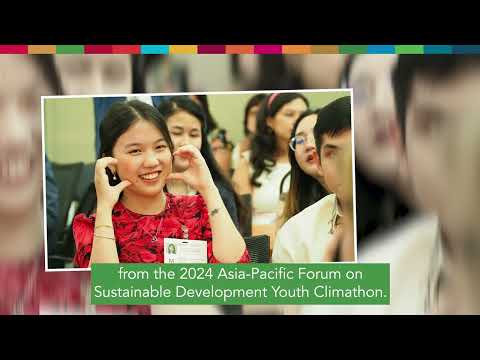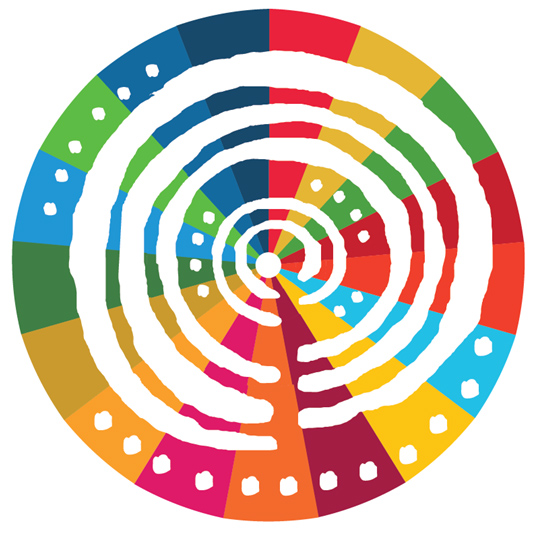ECLAC Reaffirms its Proposal for Economic and Social Transformation to Hasten Implementation of the 2030 Agenda at High-Level Political Forum on Sustainable Development
Work area(s)
José Manuel Salazar-Xirinachs, the regional organization’s Executive Secretary, actively participated in various of the global forum’s events held at the United Nations headquarters, sharing his vision for moving towards a more productive, inclusive and sustainable development model.

The Economic Commission for Latin America and the Caribbean (ECLAC) reaffirmed its proposal for economic and social transformation to hasten implementation of the 2030 Agenda, during the High-Level Political Forum on Sustainable Development (HLPF), which is taking place through Thursday, July 18 at the United Nations headquarters in New York.
José Manuel Salazar-Xirinachs, the regional organization’s Executive Secretary, actively participated in several of the global forum’s plenary sessions and side events, where he shared his vision for moving towards a more productive, inclusive and sustainable development model in Latin America and the Caribbean.
ECLAC’s highest authority participated on Tuesday, July 16 in the segment entitled Messages from the regions, where he offered his recommendations for accelerating implementation of the Sustainable Development Goals (SDGs).
In his remarks, ECLAC’s Executive Secretary referred to the means of implementation needed to achieve the SDGs. He noted that ECLAC has analyzed the six key transitions that can have catalytic and multiplier effects across the SDGs and an outsized determinant impact for achieving the Goals. For each transition, he identified three areas of implementation: i) The strategies, policies, plans and programs observed in countries for driving each transition; ii) The institutional arrangements utilized to drive and coordinate implementation; and iii) The investment and financing needs.
“These three elements must be solid and well-aligned. Financing is key, but it is not the only thing that matters; the policies and programs that countries have also matter, along with the issue of what institutional agreements and capacities they have to manage the transition,” he stated.
In addition, he warned that, with regard to financing, it is important to remember the high levels of debt and debt service and the limited fiscal space faced by many countries.
“In Latin America and the Caribbean, several countries are using up to 5 points of their GDP to pay the interest on their debt. Countries should not have to choose between debt service and addressing urgent development priorities. We have called this uncomfortable dilemma ‘development distress,’” he said.
At the session, Ambassador Maritza Chan, the Permanent Representative of Costa Rica to the United Nations, in her capacity as Vice-Chair of the Forum of the Countries of Latin America and the Caribbean on Sustainable Development, shared the key messages from the document The Challenge of Accelerating the 2030 Agenda in Latin America and the Caribbean: Transitions towards Sustainability, which constitutes the seventh report on regional progress and challenges in relation to the 2030 Agenda in the region and which was presented to countries last April.
In the framework of the High-Level Political Forum on Sustainable Development, ECLAC organized two side events. At the first of these, held on Monday, July 15, authorities formalized the launch of the Network of Latin American and Caribbean Parliamentary Committees of the Future. This event was led by ECLAC’s Executive Secretary, José Manuel Salazar-Xirinachs, who presented the “whats” and the “hows” for moving towards a more productive, inclusive and sustainable development model. Also participating were Guy Ryder, Under-Secretary-General for Policy in the Executive Office of the Secretary-General; Paula Narváez, President of the United Nations Economic and Social Council and Permanent Representative of Chile to the UN; José García Ruminot, President of the Senate of Chile; Juan Antonio Coloma, Chair of the Chilean Senate Committee on Future Challenges, Science, Technology and Innovation; Rodrigo Goñi, Chair of the Committee of the Future of the House of Representatives of Uruguay; and Daniel Zovatto, an external consultant with ECLAC.
ECLAC’s highest authority also led the side event entitled Critical Energy Transition Minerals to Accelerate Progress Towards the Sustainable Development Goals (SDGs), which was held on Tuesday, July 16 with the participation of the Executive Secretaries of the UN economic commissions for Asia and the Pacific (ESCAP), Armida Salsiah Alisjahbana; Western Asia (ESCWA), Rola Dashti; Europe (ECE), Tatiana Molcean; and the Executive Secretary of the Economic Commission for Africa (ECA), Claver Gatete. At the event, which was moderated by Thilmeeza Hussain, Director of the Regional Commissions New York Office, the participants examined the different regional perspectives, as well as the economic and development-related implications of the extraction, processing and industrialization of critical minerals.
The participation of ECLAC’s Executive Secretary in the United Nations’ most important Political Forum encompassed a variety of events. In his capacity as Coordinator of the Regional Commissions, José Manuel Salazar-Xirinachs spoke on Monday, July 8 at the plenary session on Reinforcing the 2030 Agenda and eradicating poverty in times of multiple crises, where he shared the messages from the five regions on innovative solutions and key investments for achieving the SDGs.
That same day, he met with ambassadors from the Group of Latin American and Caribbean Countries (GRULAC) to present ECLAC’s vision on regional development to them and put this regional commission’s experience and support at their disposal. In a similar vein, on Tuesday, July 9, he participated in a gathering of ambassadors from the Caribbean Community (CARICOM), where he emphasized that the high debt and debt service payments significantly deplete Caribbean countries’ fiscal income, limiting the resources for financing development.
On Wednesday, July 10, meanwhile, ECLAC’s Executive Secretary spoke at a side event on Global Energy Interconnectivity and Transition for SDGs, while on Thursday, July 11, he participated along with the Regional Commissions’ highest authorities in the event Implementing the UN Decade of Sustainable Transport. That same day he was one of the main speakers at the HLPF plenary session entitled Middle-income countries: Overcoming barriers in achieving the SDGs.
On Friday, July 12, José Manuel Salazar-Xirinachs spoke at a side event that analyzed the role of civil society and the strengthening of regional processes to achieve the SDGs.
On Monday, July 15, meanwhile, he participated in a gathering organized by the Permanent Mission of Colombia to the United Nations on scaling up debt swaps and outcome-based innovative financing mechanisms for climate, nature and food, while on Tuesday, July 16, he spoke at the UN-Water Principals Meeting where he highlighted the organization of ECLAC’s Regional Water Dialogues in Latin America and the Caribbean and the establishment of the Regional Water Action Agenda.
Related content

Messages from the Regions: High-Level Political Forum on Sustainable Development 2024
In September 2024, world leaders will convene at the United Nations in New York to forge a new international consensus on how we deliver a better present and safeguard the future. This…

The ECLAC vision for Latin America and the Caribbean. Towards a more productive, inclusive and sustainable development model
Presentation by José Manuel Salazar-Xirinachs, Executive Secretary of ECLAC, to Permanent Representatives of Latin America and Caribbean countries in New York, in the framework of the United Nations…

The ECLAC vision for Latin America and the Caribbean. Towards a more productive, inclusive and sustainable development model
Presentation by José Manuel Salazar-Xirinachs, Executive Secretary of ECLAC, to the CARICOM Caucus in New York, in the framework of the United Nations High-Level Political Forum on Sustainable…

HLPF Side Event: Global Energy Interconnectivity and Transition for SDGs
Remarks by José Manuel Salazar-Xirinachs, Executive Secretary of ECLAC, at HLPF side-event organized by Global Energy lnterconnection Development and Cooperation Organization (GEIDCO) and co-hosted…

Implementing the UN Decade of Sustainable Transport
Opening remarks of the Executive Secretary of ECLAC, José Manuel Salazar-Xirinachs, at the HLPF side-event organized by the United Nations Department of Economic and Social Affairs (DESA), together…

HLPF Plenary session. Middle-income countries: Overcoming barriers in achieving the SDGs
Statement by José Manuel Salazar-Xirinachs, Executive Secretary of ECLAC, at the HLPF Plenary session on Middle-income countries.

A key to achieving SDGs: Rights holders’ meaningful engagement and strengthening regional processes in the achievement of the 2030 Agenda
Remarks by José Manuel Salazar-Xirinachs, Executive Secretary of ECLAC, at the side-event of the United Nations' High-Level Political Forum 2024.

Evento paralelo HLPF: Aumentar las capacidades de prospectiva legislativa y gobernanza anticipatoria a través de la creación de una red de Comisiones de Futuro de los parlamentos de América Latina y el Caribe, para acelerar la Agenda 2030
Palabras de bienvenida de José Manuel Salazar-Xirinachs, Secretario Ejecutivo de la CEPAL, en evento paralelo del Foro Político de Alto Nivel de las Naciones Unidas, organizado por la CEPAL con el…

Scaling up debt-swaps and outcome-based innovative financing mechanisms for climate, nature and food
Remarks by José Manuel Salazar-Xirinachs, Executive Secretary of ECLAC, at HLPF side-event organized by the Permanent Mission of Colombia at the United Nations.

HLPF side-event Critical Energy Transition Minerals to accelerate progress towards the SDGs
Inaugural remarks by José Manuel Salazar-Xirinachs, Executive Secretary of ECLAC, at the HLPF side-event co-led by UN Regional Economic Commissions, gathered in the UN Working Group on Transforming…
